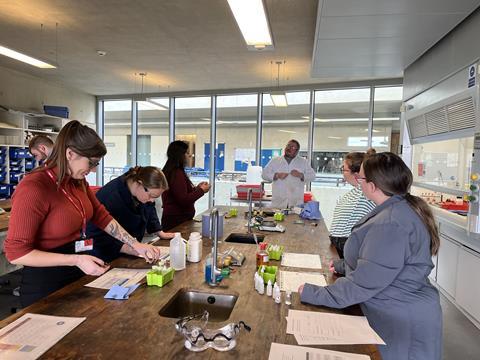Nicola Ebden is the head of chemistry at Oundle School. She received funding from the Chemistry Teaching Empowerment Fund to help with the organisation of a practical skills day in March 2023. She shared with us a bit about the event she organised, passing on her tips for anyone considering applying for the Fund.
What made you decide to apply for the Fund?

As an experienced chemistry teacher, I have supported many trainee teachers and it is surprising how little practical experience they often have. I have had the chance to attend a number of hands on practical days run by the RSC and CLEAPSS over my teaching career and although the events were always enjoyable. The demonstrations and practicals that I have routinely incorporated into my own teaching had three things in common:
- they were quick and easy to set up,
- they enabled good classroom discussion, and
- they minimised cognitive load.
I wanted to select a number of my favourites to share with local teachers, particularly those new to teaching, in order to highlight the value in undertaking practical work, whether via demonstration or class practical, to not only engage students but support their understanding of chemical concepts.
What was it that you wanted teachers to get out of attending your event?
My overall aim was to promote hands-on practical activities for use in the classroom. Boosting teacher confidence in using a range of practical activities to promote learning. The day was split into three sessions:
- Simple demonstrations – eg microscale thermite and sodium and chlorine on a brick
- Microscale practicals – Circus of experiments for use across KS3, 4 and 5 and CLEAPSS reactions of phenol
- A-level organic techniques – based on an A-level required practical (full oxidation of ethanol to ethanoic acid)
Specific benefits, other than simply getting hands on experience of a variety of practicals, were:
- Benefits of microscale chemistry: simplifying practicals to enable students to really think about the chemistry involved and reducing costs by using minimal amounts of chemicals and equipment
- Use of integrated instructions to minimise cognitive load when undertaking practical activities
- Highlighting Education in Chemistry and CLEAPSS resources
- Use of the ‘slow practical’ to discuss steps and chemistry as a group, particularly relevant to KS5
All attendees received a resource booklet and a starter pack of microscale equipment so that they could develop any practicals for use in their schools quickly.
How did you go about planning your event?
On discussion with other colleagues and my technicians, we selected a variety of activities for use across the key stages and trialled them. Ensuring they were applicable across the key stages was particularly important for the microscale practicals which are often primarily used to support KS3 lessons.
The technicians prepped them with the intention that the attendees would work in pairs or small groups but each would have a chance to undertake every experiment. As the majority were small scale or microscale activities, we did not need large quantities of chemicals or equipment.
We decided to run the event on the first Monday of our Easter holiday as the labs would be empty and most local schools would be on holiday by then. My colleagues would then also be available to help run the event and our technician would be free to support.
How did you approach your invited guests and get them on board?
Having decided upon the three sessions that we would run, I created a flyer and sent it to a number of schools via email directly. I also contacted my local RSC Education Coordinator who contacted schools in the region with details of the event and advertised it in the monthly newsletter.
Despite the efforts taken to advertise the event and it being ‘free’ we only managed to get seven teachers attending on the day. This however, turned out to be a good number as they were able to get more from it.
What did you get out of running the event?
I thoroughly enjoyed planning and running the day. It was great to spend time with early career teachers and to feed off their enthusiasm. It was clear that there was quite a range of experience with hands-on practical work and a few really lacked confidence with the techniques themselves.
It was a friendly environment so the attendees were able to discuss the practicals with each other and ask for further details if required. If I was able to support them in any way to develop their teaching and boost their confidence in selecting and delivering practical activities, then it was well worth running the event.
Since the event, I have also been in contact with a few of the attendees to further support them and am keen to develop these links next year.
Do you have any advice for teachers who are considering applying for the Fund and running their own event?
The Chemistry Teaching Empowerment Fund essentially helped me to realise an event for chemistry teachers in my local area that I had been thinking about holding for a while. Without it, I probably would not have run the event this year. The Fund certainly gave me a direction, purpose and a date to work towards.
My initial proposal was questioned by the committee so it was important to ensure I knew in my mind what the main aim for the event was, in order to justify my reasons for holding it and explain where the funding was to be used. If you have a clear aim and purpose, this will strengthen your proposal.
Want to run your own event like Nicola’s?
Find out more about how to apply for the Chemistry Teaching Empowerment Fund today.
Additional information















No comments yet